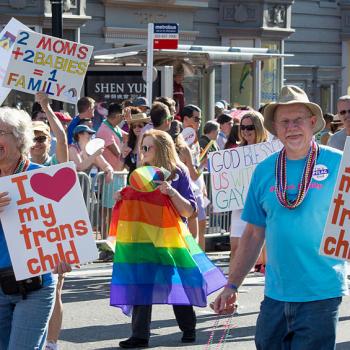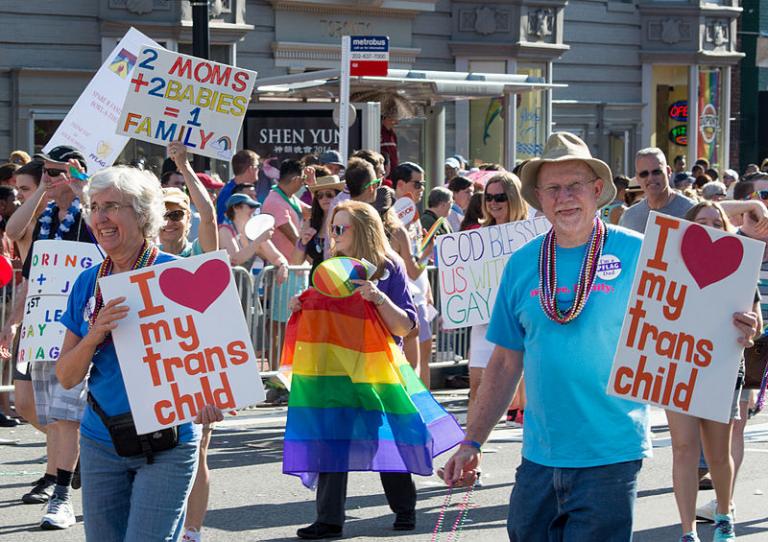Transsexual — what an archaic term! How quickly we’ve moved from the notion that a person “changes sex” by undergoing surgery, combined with a legal declaration, to the idea that it’s all about how you “identify” — and that your “gender identity” could be pretty much anything and society, institutions, and individuals, must comply with your preferences regarding acknowledgement of that identity.
Yes, I know, there is a reasonable-people-disagree type of claim that someone who is transgender experienced brain development in utero that caused the discord between that person’s biological sex, and the deep inner sense of self, and that this “brain sex” is so deeply imprinted that the only solution to deep mental distress is surgery and hormone administration combined with legal recognition of the alternate sex. But it is new, and radical, to insist that rather than this discord requiring that you change your physical appearance and legally-recognized sex, to instead say that your self-perception/identity is — all by itself — the sole determinant of whether you are male or female.
Recall that the notion of “gender” originated as a way to talk about the social construction of masculinity vs. femininity, that is, such things as social norms of suits vs. dresses, short vs. long hair, and trucks vs. dolls — and, in fact, came into use at a point when it was believed that these preferences, and, in fact, all differences besides basic physiology, were all socially constructed, rather than at least partially inborn.
It then evolved as a way to speak of the identification of men vs. women without having to use the word “sex,” which became to icky to put on a form as a checkbox, since its prior multiple meanings became so overshadowed by the meaning of “sexual intercourse.” (Poll: do you ask expectant parents, “do you know the sex” or “do you know the gender of the baby?”)
But now? “Gender” is becoming irrevokably paired with “identity” — and at the same time, according to those cutting edge ideas which ultimately filter to the mainstream, it’s meaning is being expanded far beyond “male vs. female.” There’s “gender nonconforming,” to start with, agender, gender-fluid, and the rest of Facebook’s infamous list of 51 “gender identities.” (Though, despite all the fuss about this, I wonder if they’ve removed this entirely, as I don’t see this anywhere on facebook itself.)
And it seems to me that the notion of “gender” has now evolved into a specification of personality type that’s becoming so disconnected with its original meaning as to become, well, useless, for the purpose of talking about the question of “are you physiologically male or female or indeterminite?” (and by the third category I mean that small number of people with intersex conditions, for whom their physiology, not their identity, is at issue).
The concept of “gender identity” has become a sort of stand-in for “important thing about you that you want the world to recognize.”
And this notion of the primacy of “identity” seems to be everywhere. Rachel Dolezal notwithstanding, one’s racial/ethnic status is expressed in terms of “identity” rather than the geographic origin or kinship group of one’s ancestors. To read many of the protesters at universities, for instance, it is crucial to them that this identity be affirmed and validated by the universities they attend, and (sorry, no links right now) it’s become increasingly common for students and activists to name their identities, and put them front and center.
In fact, there was a striking article on The Federalist the other day, “How Anti-White Rhetoric Is Fueling White Nationalism,” the main point of which was this:
White people are being asked—or pushed—to take stock of their whiteness and identify with it more. This is a remarkably bad idea. The last thing our society needs is for white people to feel more tribal. The result of this tribalism will not be a catharsis of white identity, improving equality for non-whites. It will be resentment towards being the only tribe not given the special treatment bestowed by victimhood.
A big part of the reason white Americans have been willing to go along with policies that are prejudicial on their face, such as affirmative action, is that they do not view themselves as a tribe. Given the inequality of resources favoring whites in our society, it is a good thing that white people view themselves as the ones without an accent. Should that change, white privilege (whatever one views that to be) will not be eviscerated—it will be entrenched.
Do I identify as white? As middle-class? As a woman? As “cis”? As Christian? These are all characteristics, to be sure, but in the end, I suppose I’d really have to “identify as” an introvert.
Yes, it’s because, when you’re in the majority, you don’t perceive this characteristic as being something distinguishing. But this isn’t “white privilege” since (I presume) it’s exactly the way Muslims experience their Muslim-ness in, say, Jordan, or Han Chinese experience their Han Chinese-ness in China.
But having said all that, if you replace “I identify as” with “I indentify with” — the meaning changes completely. “I identify with the Germans being innundated with migrants claiming asylum because my husband is German,” is perfectly natural.
So, readers, what about you: what do you “identify as”? Who do you “identify with”?











